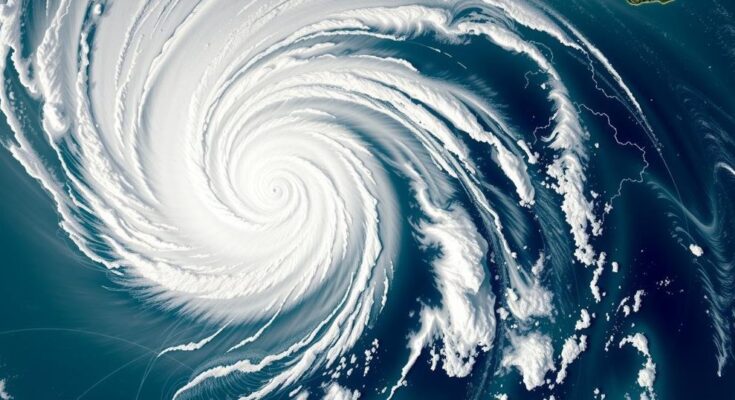Cyclone Chido is threatening Comoros, Madagascar, Mayotte, and Mozambique with strong winds and heavy rainfall. The storm has prompted school closures, red alerts, and evacuations, particularly in Mozambique and Madagascar, affecting millions. Authorities are mobilizing resources for emergency response as the cyclone season brings heightened risks of flooding and waterborne diseases.
Cyclone Chido, a formidable tropical storm, is currently advancing towards the islands of Comoros, Madagascar, Mayotte, and the African mainland, particularly Mozambique. The cyclone is anticipated to generate powerful winds and substantial rainfall, presenting a grave threat to the region. In light of this impending danger, authorities in Comoros have mandated the closure of schools as the storm is forecasted to make landfall early Saturday. Meanwhile, Mayotte is under heightened scrutiny, with French meteorological services declaring a red alert for the area.
Mozambique has proactively issued a red alert for the northern provinces of Cabo Delgado and Nampula, where over 2 million residents may face the cyclone’s wrath. The Mozambique National Meteorological Institute has warned of wind speeds reaching 200 kilometers per hour (124 miles per hour) upon landfall. Furthermore, Madagascar is gearing up for the cyclone’s arrival, with alerts directed at citizens to adopt safety measures. Evacuations are already commencing in the northern region of Diana, where the cyclone’s impact is predicted to be most intense. Authorities have been distributing food and emergency materials to the vulnerable sectors since Tuesday.
To fortify their response, the French government is mobilizing resources to aid Mayotte in mitigating prospective damage from Cyclone Chido. Emergency workers and necessary equipment are being dispatched to the region to support rescue and recovery operations. Climate specialists are voicing concerns, indicating that cyclonic activity in this area is intensifying as a result of climate change. Cyclone Chido bears the potential to trigger severe flooding, landslides, and the emergence of waterborne illnesses such as cholera, dengue fever, and malaria. As cyclone season unfolds, residents are strongly encouraged to stay updated and take adequate precautions to safeguard their well-being during this natural calamity.
Cyclone Chido is a significant weather event affecting regions already vulnerable to severe storms. The increasing frequency and intensity of tropical cyclones in this area have been linked to climate change, causing more robust storms to impact communities to a greater degree. Countries such as Madagascar, Comoros, and Mozambique have historically faced challenges posed by cyclones, which can lead to devastating consequences, including loss of life, property damage, and public health crises. It is essential for governments and citizens to stay vigilant and prepared as they confront these environmental threats, especially during the annual cyclone season that typically heightens these risks.
In summary, Cyclone Chido poses serious threats to Comoros, Madagascar, Mayotte, and Mozambique, with impending high winds and heavy rain. Authorities are responding with alert systems, evacuations, and resource mobilizations across affected regions. The situation calls for diligent preparation as the escalating threat of cyclones is underscored by evolving climate conditions. Current preparedness measures and community awareness are vital as these regions brace for the storm’s impact.
Original Source: www.inkl.com




